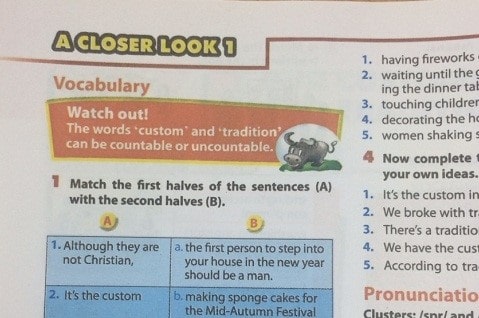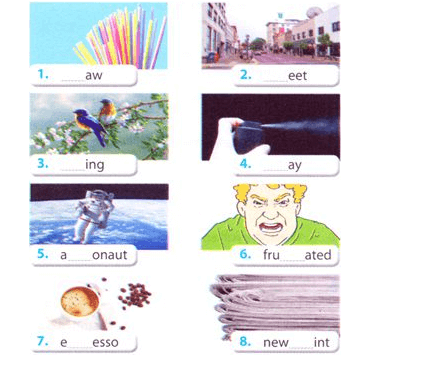


Trong bài viết dưới đây Trường kinh doanh công nghệ sẽ hướng dẫn bạn Soạn Anh 8 Unit 4 A Closer Look 1 chi tiết và đầy đủ. Mời bạn đọc cùng theo dõi nhé!

(Nối nửa phần đầu của câu với nửa phần sau của câu.)
| А | B |
| 1. Although they are not Christian, | A. the first person to step into your house in the new year should be a man. |
| 2. It’s the custom | B. making sponge cakes for the Mid-Autumn Festival instead of mooncakes. |
| 3. According to tradition, | C. the tradition of living with their parents. |
| 4 There is a tradition in our school that | D. in that country for women to get married in white. |
| 5. They broke with tradition by | E. the family has the custom of giving presents at Christmas. |
| 6. Many young people do not follow | F. morning exercise at 5 a.m. |
| 7. In my family there is a custom of doing | G. girls should wear ao dai on the first day of school. |
Lời giải chi tiết:
1 – e. Although they are not Christian, the family has the custom of giving presents at Christmas.
(Mặc dù họ không phải đạo Thiên Chúa, nhưng gia đình đó vẫn có phong tục tặng quà vào lễ Giáng sinh.)
2 – d. It’s the custom in that country for women to get married in white.
(Phong tục ở quốc gia đó cho phục nữ kết hôn mặc đồ trắng.)
3 – a. According to tradition, the first person to step into your house in the new year should be a man.
(Theo truyền thống, người đầu tiên bước vào nhà bạn vào năm mới nên là một người đàn ông.)
4 – g. There is a tradition in our school that girls should wear ao dai on the first day of school.
(Có một truyền thống ở trường chúng ta là con gái nên mặc áo dài vào ngày đầu tiên đến trường.)
5 – b. They broke with tradition by making sponge cakes for the Mid-Autumn Festival instead of mooncakes.
(Họ phá vỡ truyền thống bằng việc làm bánh xốp cho Lễ hội Trung thu thay vì bánh Trung thu.)
6 – c. Many young people do not follow the tradition of living with their parents.
(Nhiều người trẻ tuổi không theo truyền thống sống với ba mẹ.)
7 – f. In my family there is a custom of doing morning exercise at 5 a.m.
(Trong gia đình tôi có một phong tục là tập thể dục buổi sáng lúc 5 giờ.)

(Đọc lại câu đầy đủ ở bài 1 và hoàn thành các diễn đạt dưới đây.)
Đáp án:
| 1. custom | 2. tradition | 3. according | 4. tradition |
| 5. with | 6. of | 7. doing |
1. it’s the custom for somebody to do something.
(phong tục là dành cho ai đó làm một điều gì đó)
2. there’s a tradition that + clause
(có một truyền thống + mệnh đề)
3. according to tradition, + clause
(theo truyền thống + mệnh đề)
4. follow the tradition of doing something
(theo truyền thống bằng việc làm gì)
5. break with tradition by doing something
(phá vỡ truyền thống bằng việc làm gì)
6. have the custom of doing something
(có phong tục làm gì)
7. there is a custom of doing something
(có một phong tục làm gì)
(Đọc những phong tục và truyền thống sau. Tạo thành câu để nói rằng chúng có ở tỉnh em không, sử dụng bất kỳ thành ngữ nào trong phần 2. Nhớ thay đổi thì của động từ nếu cần thiết.)
Example:
(Theo truyền thống, chúng tôi có bắn pháo hoa vào đêm Giao thừa.)
(Khu vực của tôi phá vỡ truyền thống bằng việc không đốt pháo vào đêm Giao thừa.)
(Có một truyền thống ở tỉnh chúng tôi là đốt pháo hoa vào đêm Giao thừa.)
1. having fireworks on New Year’s Eve
(bắn pháo hoa vào đêm giao thừa)
2. waiting until the guests finish eating before leaving the dinner table
(chờ cho đến khi khách ăn xong trước khi rời bàn ăn)
3. touching children’s heads
(chạm vào đầu trẻ em)
4. decorating the house on special occasions
(trang trí nhà vào những dịp đặc biệt)
5. women shaking strangers’ hands
(phụ nữ bắt tay người lạ)
Lời giải chi tiết:
1. According to tradition, we have fireworks on New Year’s Eve.
(Theo truyền thống, chúng tôi có pháo hoa vào đêm Giao thừa.)
My area broke tradition by not having firecrackers on New Year’s Eve.
(Khu vực của tôi phá vỡ truyền thống bằng việc không đốt pháo vào đêm giao thừa.)
There’s a tradition in our province of having fireworks on New Year’s Eve.
(Có một truyền thống ở tỉnh ta là đốt pháo hoa vào đêm giao thừa.)
2. It’s the custom to wait until the guests finish eating before leaving the dinner table.
(Có phong tục là đợi cho đến khi khách ăn xong trước khi rời bàn ăn.)
3. There is a tradition for adults to touch children’s heads.
(Có một truyền thống cho người lớn chạm đầu trẻ em.)
4. According to the tradition, people decorate their houses on special occasions.
(Theo truyền thống, người ta trang trí nhà vào những dịp đặc biệt.)
5. Women break the tradition of shaking stranger’s hands.
(Phụ nữ phá vỡ truyền thống khi bắt tay với người lạ.)

(Bây giờ hoàn thành các câu sau với ý kiến của riêng bạn.)
1. It’s the custom in my country that_______________________ .
2. We broke with tradition by_____________________________ .
3. There’s a tradition in my family that______________________ .
4. We have the custom of________________________________ .
5. According to tradition,_________________________________ .
Gợi ý:
1. It’s the custom in my country that family members get together on Tet holiday.
(Đó là phong tục ở nước tôi khi những thành viên trong gia đình sum họp vào ngày Tết.)
2. We broke the tradition by not decorating the house on Tet holiday.
(Chúng tôi phá vỡ truyền thống bằng việc không trang trí nhà vào ngày Tết.)
3. There is a tradition in my family that we always have dinner at night together.
(Có một truyền thống trong gia đình tôi rằng chúng tôi luôn dùng bữa tối cùng nhau.)
4. We have a custom of doing exercise in the morning.
(Chúng tôi có phong tục là tập thể dục vào buổi sáng.)
5. According to tradition, adults give lucky money to children on Tet holiday.
(Theo truyền thống, người lớn lì xì tiền cho trẻ con vào ngày Tết.)
(Hoàn thành những từ dưới những bức hình với /spr/ và /str/. Sau đó nghe và lặp lại.)

Lời giải chi tiết:
| 1. straw (ống hút) | 2. street (con đường) |
| 3. spring (mùa xuân) | 4. spray (xịt) |
| 5. astronaut (phi hành gia) | 6. frustrated (giận dữ) |
| 7. espresso (cà phê espresso) | 8. newsprint (ấn phẩm) |
(Nghe và khoanh tròn những từ với /spr/ và gạch dưới những từ với /str/. Sau đó đọc các câu.)
Lời giải chi tiết:
| 1. strictly | 2. strangers, spread | 3. district, streets |
| 4. filmstrip | 5. offspring |
1. In my family, all the traditions of our ancestors are strictly followed.
(Trong gia đình tôi tất cả truyền thống của tổ tiên chúng tôi đều được tuân theo nghiêm khắc.)
2. The custom of saying hello to strangers has spread through our community.
(Phong tục nói lời chào với người lạ đã trải rộng khắp cộng đồng chúng tôi.)
3. In our district, it’s the custom for residents to sweep the streets on Saturday mornings.
(Ở quận chúng tôi, có phong tục là người dân quét đường vào sáng thứ Bảy.)
4. That filmstrip really highlighted our customs and traditions.
(Đoạn phim thật sự làm nổi bật phong tục và truyền thống của chúng tôi.)
5. Parents usually want their offspring to follow the family traditions.
(Ba mẹ thường muốn con cái theo truyền thống gia đình.)
Như vậy bài viết trên Truongkinhdoanhcongnghe đã hướng dẫn bạn Soạn Anh 8 Unit 4 A Closer Look 1 chi tiết và đầy đủ. Chúc bạn học tập tốt!
Xem thêm: